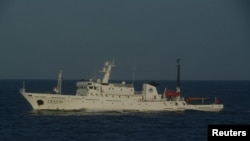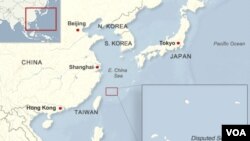Japan says four Chinese government ships entered waters near contested Tokyo-controlled islands in the East China Sea, as a territorial dispute between the two Asian giants drags on.
Japan's Coast Guard said the Chinese surveillance vessels spent several hours within a 22-kilometer zone surrounding the islands Thursday. It said this is the first time in three weeks that Chinese ships have entered the zone, which Japan considers its territory.
The move prompted a "strong protest" by Japan's foreign ministry. China's foreign ministry shot back, saying the ships were conducting "routine patrols" to "safeguard the country's sovereignty."
Secret talks
Both sides held secret talks last week in Shanghai to resolve the dispute over the islands, which lie in rich fishing grounds and are surrounded by potential energy deposits.
Japanese media reported Thursday that preparations are being made for another round of talks next week to resolve the stand-off.
Meanwhile, U.S. Assistant Secretary of State Kurt Campbell discussed the feud Thursday in Tokyo with senior Japanese officials.
"We talked about the importance of ensuring that relations between Japan and China are restored and improved and that is in the best interest of not just the peoples of both countries, but of everyone in the Asia Pacific, including the United States."
Last month Campbell said the dispute over the islands, known in Japan as Senkaku and in China as Diaoyu, "clearly" falls within the scope of the U.S.-Japan security treaty that obliges Washington to come to the aid of Tokyo if attacked.
Bias
Many in Beijing are unhappy with what they see as Washington's partiality regarding the sovereignty of the islands, despite U.S. insistence that it does not take sides in the dispute.
Earlier this week, Beijing apparently rejected efforts by a U.S. diplomatic delegation to mediate the dispute. China's official Xinhua news agency said Vice Premier Li Keqiang stressed China's "solemn stance" on the issue during Tuesday meetings with former White House National Security Advisor Stephen Hadley, ex-deputy Secretary of State Richard Armitage, and others.
Japan's Coast Guard said the Chinese surveillance vessels spent several hours within a 22-kilometer zone surrounding the islands Thursday. It said this is the first time in three weeks that Chinese ships have entered the zone, which Japan considers its territory.
The move prompted a "strong protest" by Japan's foreign ministry. China's foreign ministry shot back, saying the ships were conducting "routine patrols" to "safeguard the country's sovereignty."
Secret talks
Both sides held secret talks last week in Shanghai to resolve the dispute over the islands, which lie in rich fishing grounds and are surrounded by potential energy deposits.
Japanese media reported Thursday that preparations are being made for another round of talks next week to resolve the stand-off.
Meanwhile, U.S. Assistant Secretary of State Kurt Campbell discussed the feud Thursday in Tokyo with senior Japanese officials.
"We talked about the importance of ensuring that relations between Japan and China are restored and improved and that is in the best interest of not just the peoples of both countries, but of everyone in the Asia Pacific, including the United States."
Last month Campbell said the dispute over the islands, known in Japan as Senkaku and in China as Diaoyu, "clearly" falls within the scope of the U.S.-Japan security treaty that obliges Washington to come to the aid of Tokyo if attacked.
Bias
Many in Beijing are unhappy with what they see as Washington's partiality regarding the sovereignty of the islands, despite U.S. insistence that it does not take sides in the dispute.
Earlier this week, Beijing apparently rejected efforts by a U.S. diplomatic delegation to mediate the dispute. China's official Xinhua news agency said Vice Premier Li Keqiang stressed China's "solemn stance" on the issue during Tuesday meetings with former White House National Security Advisor Stephen Hadley, ex-deputy Secretary of State Richard Armitage, and others.






